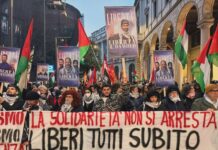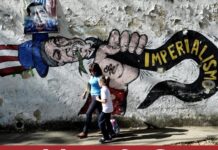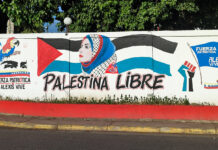Interview via Al-Jazeera. Online here: http://www.aljazeera.com/news/2015/07/qa-break-israeli-occupation-150725123515465.html
Jerusalem – Khader Adnan has become a symbol of the Palestinian resistance to occupation.
On 10 separate occasions, he has been placed in administrative detention, a practice that allows Israel to detain prisoners without charge for renewable six-month periods. In 2012, he rose to prominence after waging a 66-day hunger strike against his detention, and after his rearrest last year, Adnan embarked upon another 56-day hunger strike that ended in his release on July 12.
Adnan, who continues to recover in hospital, spoke to Al Jazeera about his experience and how his hunger strike has drawn attention to the cause of thousands of Palestinian prisoners in Israeli jails.
Al Jazeera: How is your health now?Khader Adnan: I still have an issue with my stomach as a result of the hunger strike, but I’m in a state of recovery and being observed by the medical staff. I find it difficult to eat and drink, but I have great faith in God that I’ll recover.
Al Jazeera: It has been reported that during your 2012 hunger strike, you took some supplements, but not this time – is that correct?
Adnan: Yes, on this strike I refused all supplements. I had only water. No salt, no vitamins, no sugar. This was despite the fact that even by Red Cross standards, taking these things does not constitute breaking a strike.
In 2012, on the 43rd and 44th day of the strike, I took two tablets each of magnesium and potassium, and then on the 54th day I took glucose. That was all.
Also, while in 2012 I accepted health checks on the 43rd day of the strike, I refused these in 2015 until the end.
Al Jazeera: The day after being released from prison, you visited Jerusalem and were then rearrested by Israeli police. Can you tell us what motivated you to visit and how you were detained?
Adnan: I went to Jerusalem to firstly say thank you to everyone. I demanded to be released on the 12th of July before Laylat al-Qadr [the night when the first verses of the Quran were revealed to the Prophet Muhammad] as it is the holiest day of the Islamic year, and I wanted to be in the holiest mosque in Palestine on that day.
My initial release was strange. I was released early, at 1am, which has never happened in the history of Israeli prisons. Usually releases take place at 10 in the morning or in the late afternoon.
The point of the early release was so that I wouldn’t be welcomed by my people and family and so that there wouldn’t be a popular reception. I stayed one night with my parents and the next day I was smuggled into Jerusalem from Jenin.
The day before entering Jerusalem, I received a message [indirectly from Israeli security services] that if I was to be seen in Jerusalem, then I would be arrested. However, despite this, I travelled in a smooth and organised fashion and visited four homes [that] were symbols of various sectors in our society: of martyrs, prisoners, lawyers and trade unionists, and I wanted to send a message to all of these sectors.
After that I tried to go to Al-Aqsa Mosque. I got to Bab a-Zahara, but despite being disguised by wearing a robe, a walking stick, and keffiyeh, I was noticed by the police. I suppose they saw posters of me, which were up around Al-Aqsa Mosque. One of the border police was holding a poster with my face on it. From there, I was taken to Khurshi prison by Jaffa Gate. I was held for four and a half hours, during which time I refused to eat or speak.
Al Jazeera: You have now returned to Jerusalem again, this time while being admitted to hospital. What happened?
Adnan: The day after being rearrested, I went to sleep at my parents’ house, but the next day I felt a great pain in my stomach. I went to Jenin hospital, but they said the treatment I required was available in al-Makassed hospital in Jerusalem, so the next day I was transferred here.
It’s funny how within a few days, I first came in one day in disguise and then another in an ambulance. One time I was afraid of being caught; the next time I entered with great confidence.
I came in with confidence and without losing any dignity because I had the knowledge that if anything happened to me, then Israel would face a revolt from the people.
Al Jazeera: How integral is the prisoners’ movement to the overall strategy to liberate Palestine?
Adnan: The prisoners’ movement and hunger strikes in particular are a symbol of the principle and demand for justice in Palestine. It proves that of course it is both possible and necessary to break the Israeli occupation.
The prisoners, with strong will, are able to hold onto their rights. It is a symbol to show you what is possible. This is something that the Palestinian leadership must learn from. How it is that a Palestinian prisoner can be on hunger strike, facing an occupation and a jailer with all the technology and forces at their disposal, and yet can still defeat them? Our unarmed resistence can defeat the bullet. That’s what this represents.
But we need the unity of the Palestinian national movement. We need to fully convince the official bodies, the leadership and the public of the need for resistance. We need to weld all our energies together, from Jerusalem, Gaza, the West Bank, and the diaspora. We need the unification of all these energies with the free people of the world in defence of the rights of prisoners and all Palestinians.
Al Jazeera: While on hunger strike, were you aware of actions taking place in solidarity with you?
Adnan: From my bed at al-Makassed hospital, I send a message of solidarity to all people who have supported me. There is a very important symbolic significance to this hospital. It accepted all of the injured and martyred from the Al-Aqsa Mosque. The bed I’m on now may have been sat on by a martyr or someone injured in defence of Al-Aqsa Mosque, and it’s a great honour and privilege to be on this bed.
What unites us as free people of the world is much greater than what divides us. I send my love and solidarity to all the free people and my great thanks to them and appreciation for all they’ve done.
Al Jazeera: How much support did you receive from the Palestinian leadership?
Adnan: There was some communication between myself and the ministry for prisoners. The support from the public and official bodies was more delayed and much less on this occasion. I did get support from the streets, but actions that were taken were less than in 2012.
Al Jazeera: Much of the Arab world is in turmoil. Do you have a message for the youth of this region?
Adnan: Yes, I want to send a word to the Arab and Muslim youth where this barbarism is taking place; in Yemen, Iraq, Syria, the Sinai, and Libya. Many young people are coming from all corners of the world to kill and to be killed. We want you alive. We need you to hold the right interests for the progress of this land.
We need to remember that we have a wounded Palestine in our hands. The cause of Palestine must be at the centre of everything we are building. Your brothers and sisters have been in the occupation prisons for decades. Al-Aqsa Mosque is being threatened and attacked. Palestine is occupied and you have to stand with Palestine.
Translation by Vivian al-Haddad.
Discover more from Samidoun: Palestinian Prisoner Solidarity Network
Subscribe to get the latest posts sent to your email.




